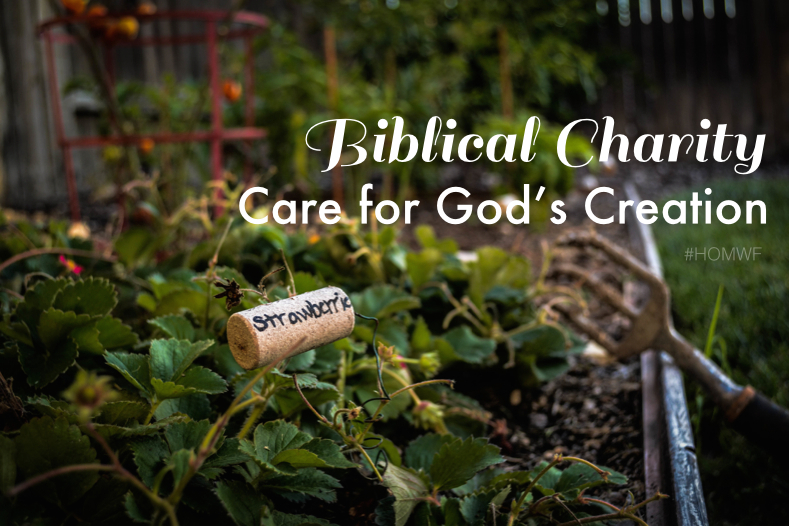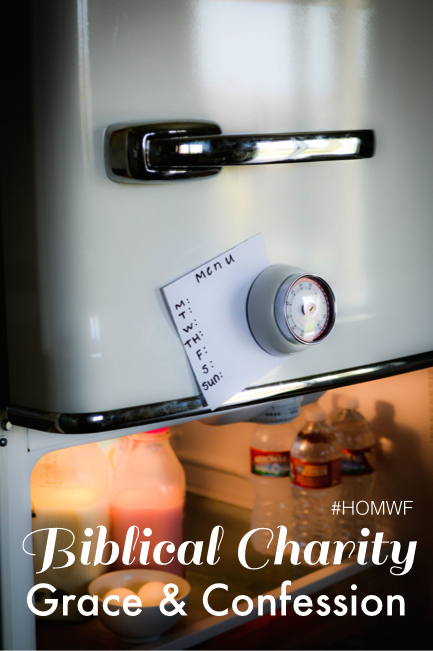Biblical Charity
What does scripture say about Charity & How do we live it out in our daily lives?
More often than not, our encounter with charity is when the visiting priest or sister comes to share their missionary work and ask for a donation toward the project's visions. And many times, we may feel a little discouraged by the end, thinking we aren't a charitable person or "doing good" like they are. October is such a big month in the Church: 40 Days for Life is happening, food shelters are starting to collect for the upcoming holidays, pregnancy crisis centers are rallying for extra supplies & toys.... so we thought it would be a great opportunity to learn what God envisions as an act of charity. We'll be talking about things like dignity of life for the unborn, poor, homeless, and sick, but we are also going to dive into the "mundane" of life, and encourage you by showing that we all are charitable in our daily lives already! So do not be discouraged! Let’s grow even more in our charitable hearts.
STUDY POSTS

I had the privilege of studying abroad for four and half months in Austria. In those four and half months I met a certain beauty that was unimaginable. One of the classes I took was Ethics, in this class we were challenged to go walk outside and soak in the beauty.
Every morning we get up, we eat, we go to work (or school), then we come home eat got to sleep… then we do it all over again. But instead of this just being a way to gain income to provide the necessities to ourselves and our families, shouldn't we be using this as a way to continue in our active participation within the community and society? The answer to this is yes.
We are all created in the image and likeness of God and have the right to life, not just in a spiritual sense, but also on earth. Growing up, I always heard the saying live a life full of JOY; Jesus, Others, You. It is our duty to respect the rights of others and to respect the care that they are being given as long as it is aligned with God’s commandments and His example he laid out for us.
We are called each and everyday to help those in need. This doesn’t mean to give money to every single homeless or poor person we see every time we see them. If we did, I am sure we would soon run out of money ourselves, and how would that be improving situations? You’re right, it wouldn’t. But if we sit back refusing to help the poor, then how are we showing them the face of Jesus.
Our Church is so beautiful! It is the largest charity in the world: the largest provider of food, education, and health care. It goes beyond the providing the basic necessities of the body but also cares for it in the spiritual realm. It took the study and reflections of preparing this post for you, that I realized this!
We are all created in the image and likeness of God. I feel like I have said that ten million times. But it truly isn’t something we should forget. But when we think of dignity of life, the first thing our minds usually jump to is abortion and the dignity to a child’s life. But the basic dignity we all possess originally comes from God, and we are to see each and every person through the eyes of God and to love them because God loves them.
Sometimes charity requires that we get our hands dirty. In the parable of the Good Samaritan, the priest and the Levite had good reason to pass the Jewish robbery-victim on the road. They had things to do, rituals to attend, families to take care of, reputations to guard. The robbery victim was either dead or almost dead, anyway. They probably thought they could do nothing to help him. There were dozens of excuses for not helping the Jewish man, and all of them were culturally relevant and valid.
The Visitation follows immediately upon the Annunciation. Mary received our Lord and then set out to visit Elizabeth as soon as she heard that she was pregnant. St. Luke wrote she traveled in haste. She did not hesitate, she did not deliberate, she did not waste any time, she just went.
Saying “yes” to our Lord is a two-part process:
Empty. Vulnerable. Powerless. In a society where we are expected to control everything about our lives, embracing or welcoming any of these weaknesses is not only scary, it’s ludacris. We learn from an early age to control language so that we can control conversations.
We all have two feet that we stand tall on every day, two things that support us and hold us up each and every day and get us to where we need to go. Even if we are on crutches, we have two things that hold us up. Just as we have two feet or two things that keep us standing there are ‘two feet’ to Catholic teaching as well.
There are so many things “to-do” that it can get overwhelming. How do we sort through these things and fit it to modern day living?
There are seven spiritual works of mercy: to admonish the sinner, to instruct the ignorant, to counsel the doubtful, to comfort the sorrowful, to bear wrongs patiently, to forgive all injuries, to pray for the living and the dead.
In order for us to truly be able to receive that sanctifying grace, which is the first thing we need in order to get into heaven, we need to receive the sacraments in order to allow that sanctifying grace to grow and sustain itself in us.
There is a true and utter need in our hearts and souls for sanctifying grace. But what it is it? There are two types of grace in our lives; sanctifying and actual. Sanctifying grace is
One area that we usually don't like to talk about much is that person (or persons) who has injured us deeply, whether it be physical, emotional, spiritual, or mental. No matter how small or big, each of us probably has one or more people whom we need to forgive. For some of us, we still see this person often. For others, we haven't seen them in years. When Jesus tells us that we must love our enemies and pray for those who persecute us, does someone like this come to mind?
When we read the verse, "Love your neighbor as yourself" (Mk 12:31), it's easy to feel fairly confident. We know we are pretty nice people, we don't really have malicious intentions, and we do good things for others. However, in Matthew 5:44 Jesus tells us, "You have heard it said, 'You shall love your neighbor and hate your enemy.' But I say to you, love your enemies and pray for those who persecute you . . ."
Every Sunday we attend Mass and hear the Word. Every time we open the Bible, we are readers/hearers of the Word. Every time we pray the Rosary, we are reciting the Word and listening in on the meditations. Are we doing anything with the Word?
…Any Matt Maher fans out there? There is a song that he sings that puts Isaiah 61 to music, almost like a battle cry to energize the troops.
Many of us have attended a wedding or two, hearing the reading “love is patient, love is kind…” and we may be guilty of kinda tuning it out. Yea, yea. We know – we’ve heard it a million times.
One of my favorite movies is Under the Tuscan Sun. In it, Diane Lane’s character Francis endures a divorce and heals herself of her heartbreak by serendipitously buying a house in Italy.
To find an official modern day definition of love, I went to the most reliable source of modern day meanings for words: Urban Dictionary*.
It may have been several years since catechism class, or maybe it’s a new topic all together. The virtues are something that we’ve heard of but may not know how impactful it is to our faith life.





















